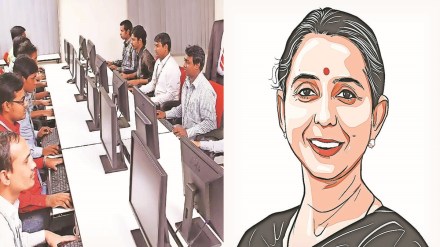By Uma Ganesh
The threat of job losses envisaged with the advent of AI is turning out to be real. The job pulse monitored at the campus hiring drives this summer indicates disappointment for thousands of students who are yet to find entry-level jobs. The Economic Survey (February 2025) also indicated that middle and low income roles in the IT, BPO and manufacturing sectors jobs would be at risk. A Linkedin report has highlighted that automation with AI could result in job losses to the tune of 12-18 million jobs in 2025.
Simple coding and testing related tasks are getting automated and hence hiring for these jobs is reducing drastically. BPO operations are getting automated and there is a significant reduction in hiring of agents for these jobs. The introduction of robots in manufacturing, agriculture and construction could reduce the requirement of manual labour. With this trend expected to continue in the coming years, how are young people equipped to deal with this scenario?
Readiness of the talent pool largely depends upon the initiative of academic institutions. Top tier institutions are changing their curriculum and programmes with the introduction and strengthening of subjects such as AI/ML, data science, cloud and cybersecurity. However, the concern is with mid tier and rural colleges which produce the majority of the engineering graduates and may not be adequately equipped to adapt to the dramatically changing environment.
As per the Nasscom-BCG report of 2024, over 2,500 colleges have adopted AI skilling modules. However the placement rate in Tier 2/3 colleges has shown a 15-20% decline in IT roles over the last 5 years. Many of the academic institutions have limited industry networks and hence their students lack exposure to the emerging needs of the industry and their dependence on familiar, traditional jobs continues to be high.
With the world looking upto India for an AI-infused talent pool and Nasscom estimating this requirement to touch over 1 million by 2027, there is an urgent need to address the skill gap. Currently less that 20% of the universities are offering AI aligned curriculum. The focus of training should be centered around not only imparting AI-related technical skills, but has to cover those who have to be provided with relevant skills to adapt to the new jobs that are appearing in the horizon.
For instance, students pursuing commerce education need to be imparted skills in data literacy, basic proficiency in Python and generative AI tools in order to find a fitment as analysts in finance, tax and compliance, supply chain and operations etc. Those seeking jobs in customer service or digital marketing should have the ability to leverage AI tools to optimise campaigns and carry out performance analytics or help with training chatbots in different domains. Thus in every field at entry or mid-level, the understanding of use of AI tools is becoming critical and the heavy lifting needs to take place within the realms of academic institutions in partnership with the industry.
The writer is chairperson, GTT Foundation.
Disclaimer: Views expressed are personal and do not reflect the official position or policy of FinancialExpress.com. Reproducing this content without permission is prohibited.
